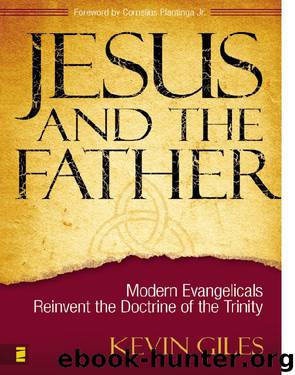Jesus And The Father by Kevin Giles

Author:Kevin Giles
Language: eng
Format: epub
ISBN: 9780310866381
Publisher: ZONDERVAN
CHAPTER
5
THE FATHER AND THE SON
DIVIDED OR UNDIVIDED
IN POWER AND AUTHORITY
We now come to the most fundamental and distinctive element in the contemporary evangelical doctrine of the Trinity that I am disputing: the eternal subordination of the Son in authority. Professor Wayne Grudem is emphatic that this idea stands right at the heart of his understanding of the Trinity. It is his view that the Father has “the role of commanding, directing, and sending,” and the Son the role of “obeying, going as the Father sends, and revealing God to us.”1 It is differing authority, he says, that primarily distinguishes the divine persons. He writes, “Authority and submission between the Father and the Son . . . and the Holy Spirit, is the fundamental difference between the persons of the Trinity.”2 And again, “If we did not have such differences in authority in the relationships among the members of the Trinity, then we would not know of any differences at all.”3 There is for him nothing more important than this authority structure in the Trinity and between men and women. It is “the most fundamental aspect of interpersonal relationships in the entire universe.”4
The 1999 Sydney Anglican Diocesan Doctrine Commission Report, “The Doctrine of the Trinity and Its Bearing on the Relationship of Men and Women,”5 also makes the eternal subordination of the Son in authority the most fundamental issue. The whole document is predicated on the premise that the Father is (authoritatively) “head” over the Son just as husbands in the home and men in the church are (authoritatively) “head” over women. In this report the eternal subordination of the Son in authority is predicated on the differences in the being or nature of the person of the Son, not simply in differing roles or functions, and it is said to be involuntary. The authors write, “The Son’s obedience to the Father arises from the very nature of his being as Son. His freedom consists in doing what is natural to him, which is to submit to his Father . . . he is incapable of doing other than the Father’s will.”6 His obedience to the Father is not “voluntary, temporary, and personal.”7 Rather it reflects “the essence of the eternal relationship between them.”8
Robert Doyle, a key contributor to this report, writing in 2004 is still arguing for “the priority of the Father” in authority in the Godhead. He designates the Father the “eternal Monarch” or sole ruler and says the Son defines himself “in subordination to that monarchy.”9 The American evangelical theologian Bruce Ware is of the same opinion. In rejecting the egalitarian case that the Son is only subordinated in authority to the Father in taking the form of a servant and in becoming man, he says, “An eternal relationship of authority and obedience is grounded in the eternal, immanent, inner-trinitarian relations of Father, Son, and Holy Spirit.”10 Then later he adds, “The authority-obedience relation of Father and Son in the immanent Trinity is mandatory if we are to account for God the Father’s purposes to elect and save.
Download
This site does not store any files on its server. We only index and link to content provided by other sites. Please contact the content providers to delete copyright contents if any and email us, we'll remove relevant links or contents immediately.
Angels by Billy Graham(1917)
How To Be Born Again by Billy Graham(1775)
Peace with God by Billy Graham(1679)
Unbroken Curses by Rebecca Brown & Daniel Yoder(1569)
God's Prophetic Symbolism in Everyday Life by Adam Thompson & Adrian Beale(1482)
The School of Biblical Evangelism by Ray Comfort(1424)
Call by Rick Joyner(1422)
Martin Luther: The Man Who Rediscovered God and Changed the World by Eric Metaxas(1385)
Power over the Enemy by John Osteen & Joel Osteen(1339)
Fresh Wind, Fresh Fire by Jim Cymbala(1231)
Jonathan Edwards: A Life by Marsden George M(1230)
Prayers That Bring Healing and Activate Blessings: Experience the Protection, Power, and Favor of God by John Eckhardt(1215)
Liturgy of the Ordinary by Tish Harrison Warren(1207)
The Supernatural Power of a Transformed Mind Expanded Edition: Access to a Life of Miracles by Bill Johnson(1195)
Unmasking the Devil: Strategies to Defeat Eternity's Greatest Enemy by John Ramirez(1189)
An Altar in the World by Barbara Brown Taylor(1189)
Reformation Theology by Littlejohn Bradford(1181)
Martin Luther by Mansch Larry D.; Peters Curtis H.;(1128)
Seeing the Voice of God: What God Is Telling You through Dreams and Visions by Smith Laura Harris(1123)
